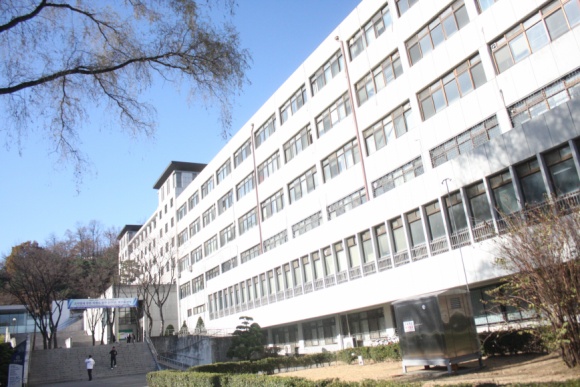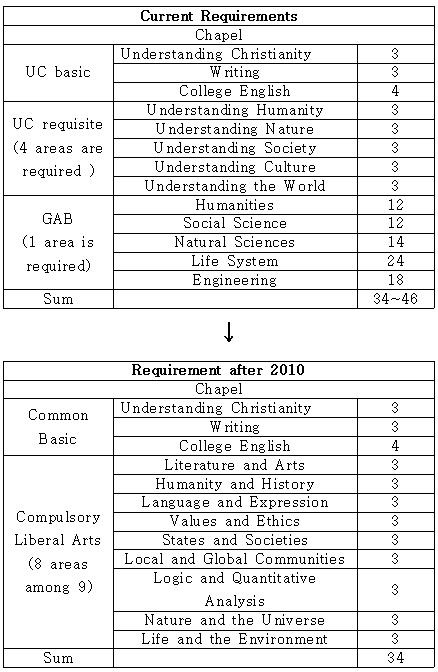The revival of the department-based system and its future

KIM ENTERED Yonsei Univ. as a student of University College, Foreign Language & Lit. last year, looking forward to majoring in English Language & Lit. starting from his sophomore year. As he always dreamed of becoming a great scholar in English literature, he wanted to take relevant courses as soon as possible. Contrary to his expectations, there was no such freedom, as he spent one-fourth of his university life struggling with required courses that were beyond his interests. What is worse, since his GPA was not high enough, he failed to enter the department he aspired to study in. There is fierce competition among freshmen every year to enter the most popular departments. With the exception of a few colleges, situations like Kim's can easily be seen among Yonseians. However, such problems are expected to be solved as Yonsei Univ. decided to implement a new system starting with the class of 2010.
History of the integrated system and its shortcomings
The integrated system, also called hakbuje in Korean, was first introduced to universities in 1995 as part of the 5.31 Education Reform Bill enforced by the Kim Young-sam Administration. The reform bill was expected to strengthen the global competitiveness of Korean universities by incorporating the education system of developed countries. It included the concept of the integrated system, which selects freshmen in bigger academic units than the previous department-based units. Yonsei Univ. adopted the integrated system in 1996, and after four years University College was established to provide basic liberal arts education for freshmen. Other universities also hastily introduced the system around that time because of the government's policy of providing mass financial subsidies to universities that adopted the integrated system.
The consequences of such imprudent implementations of the system were evident at Yonsei Univ. Although the original goal of the integrated system was to give freshmen time to think about their field of interests and choose their majors accordingly, some unexpected side effects transpired. Students began to compete for the popular departments, causing an imbalance in the number of students in other departments. As a result, students were assigned to departments based on their GPA. Students who entered an unwanted department in their second year became dissatisfied. For example, most students of University College, Social Science, are willing to enter the Dept. of Political Science & Int. Studies, and some even put off being assigned the major until the middle of their sophomore year to get their desired majors. Another problem indicated was the weakening of major education. Because students began to take their major courses as a sophomore, the period of learning expert-knowledge became shortened to three years. To enter the desired majors, some students in their "third semester" take only GPA-friendly lectures to get high GPAs, which also lead to fewer major specific courses taken.
Ban, a new form of community created with the integrated system, also has not functioned as a durable community where members could feel a sense of belonging. Although students could belong to ban when they had yet to select their majors in their freshmen years, the community no longer remained as a connected group once students became sophomores and declared their majors. It is natural that their university life becomes department-centered as they take major courses with students in the same department. However, the ban-based community consisted of students from different majors. It could not provide a foundation for long-lasting relationships to develop among students in the same major, and thus many left their ban for other communities like dongahree. "The coexistence of department-based communities and ban has imposed students with a double identity and gave confusion about where to belong in their sophomore years," says Jung Jun-young (Former Pres., Student Council of Col. of Social Science). In the case of Col. of Liberal Arts, there are 10 departments and 11 ban, all of which have their own representatives who participate in managing the college's student body. This has made it difficult for each college to make one voice concerning the same issue.
A movement towards switching back to the department system
There were high expectations, for the integrated system was once to make remarkable advancement in Korean universities struggling to compete with prestigious universities of the world. Nevertheless, the result was disappointing and it rather endangered academic diversity. Kim Young-se (Dean, University College) says, "As some 'unwelcome majors' had difficulties securing the student quota, the demand to select students on a department-level, not on a college-level, has existed since the start of the integration system." Students and professors in most universities have continued to argue for the abolition of the current system and a return to the department system.
Re-implementation timeline in Yonsei Univ.
April 2008. Yonsei Univ. creates a task force to prepare for the re-implementation of the department system.
↓
October 2008. Five colleges, including the Col. of Liberal Arts and Col. of Science, decide to select their freshmen on the department-level starting from 2011.
↓
January 2009. The provision that had prohibited universities from selecting students in department-based units is finally revised as announced last year. Korean universities are allowed to decide freely whether to enforce the integrated system or not.
↓
March 2009. Two more colleges, Col. of Business & Econ. and Col. of Life Science & Biotech., decide to enforce the department system, and thus the department system is to be implemented in every department of our school from next year.
↓
After Yonsei Univ. confirmed such plan in March 2009, the movement towards going back to the department system is spreading out around other Korean universities. Konkuk Univ. and Hankook Univ. of Foreign Studies are also going to apply the system for the incoming freshmen next year, while other universities like Korea Univ. and Ewha Women? Univ. are positively considering it.
<Tables 1 & 2.>
Changes after 2010
Switching back to the department system is expected to strengthen major education because students start to take major courses from their first year. Kim Eun-jeong (Academic Advisor, University College) says, "As some of the current General Area Basics (GAB) lectures are replaced by Major Basic lectures in the new system, the overall quality of major education would be increased with a broader range of choice." According to the 2009 Yonsei Univ. Education System Reform Bill, the structure of the compulsory liberal arts becomes simplified from four categories to only two categories, thereby increasing the chance to take more major classes over four years. Currently, students are required to take 34 to 46 credits for liberal arts according to one's majors, but such regulations will be decreased to 34 credits regardless of one's major. <See Tables 1 & 2.>
Besides, the reform of the liberal arts education system will also bring an improvement to the quality of lectures. Kim Jean-young (Associate Dean, Office of Academic Affairs) says, "The new system benchmarked the liberal arts curriculum of foreign universities, and the number of lectures taught by full-time professors will increase as well."
The problem of excessive concentration to certain majors will disappear as all freshmen already have their major upon entering our university. At the same time, such change is expected to bring a more durable and cohesive student community based on one's department, where students are members from their freshmen year. Jung says, "As students" extracurricular and academic activities are integrated into a department-based community, we are expecting new members to feel more attachment towards one another."
University College was originally established for the purpose of managing the integrated system. Regardless of the changes, the role of University College will remain the same and perhaps strengthen. Kim Young-se says, "Even after the change, the importance of liberal arts education will remain the same due to the need for a balanced academic development. University College will still be responsible for freshmen education and organizing the liberal arts curriculum." Moreover, the role of University College has been expanded to oversee the specialized basic curriculum at Yonsei International Campus in Songdo, which will open partially next year.
For a successful settlement of the department system
In order not to repeat the past failures of the integrated system caused by the hasty decision, and to minimize the possible side effects, the school authorities should fully recognize the limits of the department system. The conversion to the department system will inevitably prevent the students' chance to think about their most suitable major, which was facilitated under the previous system. "I entered the Col. of Social Science, thinking only vaguely about studying Political Science & Int. Studies, since the major seemed most helpful for employment. However, as I took diverse lectures during the year, I discovered my aptitude in Sociology and declared it as my major, which I am very satisfied with," says Jang Byeong-chae (Soph., Dept. of Sociology). The recent academic trend of transcending boundaries between different fields, so-called consilience, also raises a question of whether the department system can nurture the human resources that society demands. To overcome these two possible shortcomings, the school should try to guarantee the students' chance to study various fields even under the department system.
Moreover, students have the right to be informed of new changes in the school system. Those who will be most influenced by the change in the academic system are current freshmen, sophomores, and students entering Yonsei Univ. next year. The democratic process of collecting the students' opinion has been absent in implementing this new system, which has been disturbing. Jeong Da-hye (Former Pres., Student Council of Col. of Liberal Arts) says, "What the school intends through the new system, especially the reinforcement of major education might not be achieved by merely adjusting the curriculum or credit requirements, without reflecting the students' opinion." It took less than a year for our school to confirm the overall re-implementation of the department system after the government's announcement. Considering that other universities have decided only partial implementation or are still discussing the possibility of change, there seems to be a need for school authorities to be more prudent and attentive to the voice of students.
* * *
No matter how perfectly designed the new system may be, the system itself cannot guarantee the academic improvement of Yonsei Univ.. Kang Min-hee, who was accepted through our school's 2010 early application as an economics major, says, "I hope I can focus more on the major lectures and have a better sense of belonging to my department. I am expecting that recent changes in our school will provide more satisfaction to students in the long run." To achieve her dream as well as those all of Yonseians dream, the school authorities, professors, and students need to keep a sharp and constant lookout on ensuing changes after the implementation of the new system.

